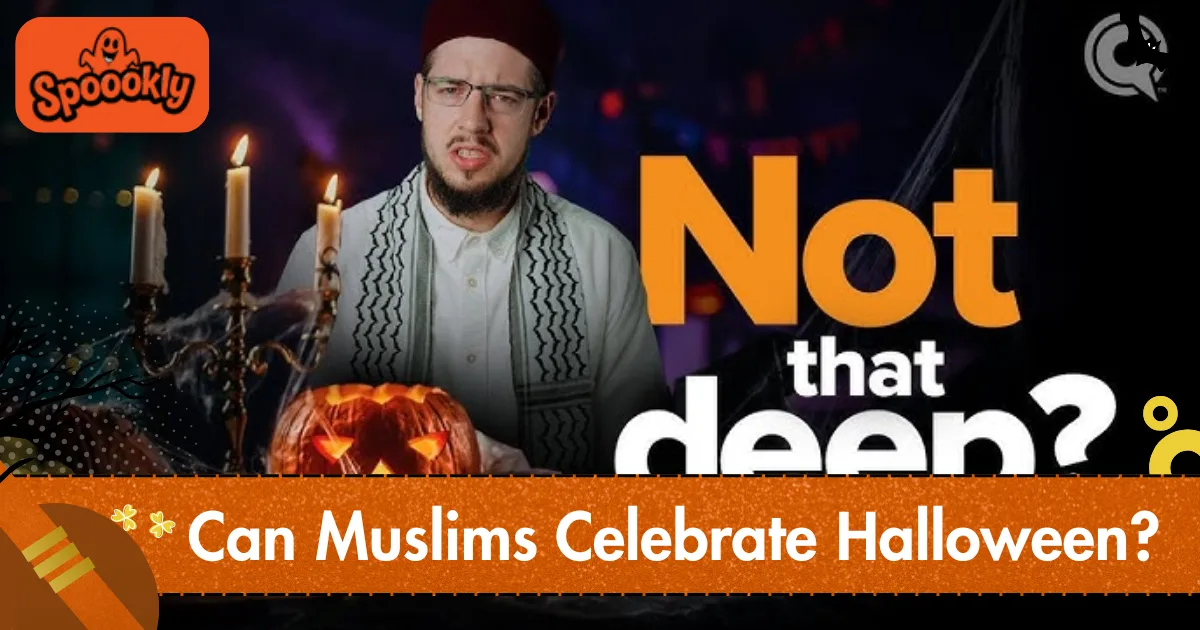Halloween is often seen as a fun night of costumes, candy, and parties, but for Muslims, the question goes beyond whether the treats are good or the outfits are scary enough.
It’s about whether celebrating it aligns with Islamic teachings. Many Muslims wonder if Halloween is just harmless entertainment or if it carries beliefs and practices that conflict with their faith.
As someone who’s been asked this more times than I can count, I can tell you it’s not a simple yes or no. You have to look at what Halloween really is, where it comes from, and what Islam says about participating in such events.
Understanding What Halloween Is About

Halloween didn’t just appear out of thin air. It has roots in ancient Celtic festivals like Samhain, where people believed spirits could cross into the human world. Later, it blended with Christian traditions like All Saints’ Day.
Over time, it turned into the modern mix of trick-or-treating, pumpkin carving, and spooky fun we see today.
The thing is, even though Halloween today is more commercial than religious, many of its customs still connect to themes of superstition, the spirit world, and rituals.
For Muslims, this history matters because Islam encourages avoiding practices linked to beliefs that contradict Tawheed (the oneness of God).
Why the Question Matters for Muslims
In Islam, celebrating something isn’t just about having fun it’s about what the celebration represents.
If a festival has origins in religious beliefs other than Islam, or if it promotes concepts against Islamic values, scholars often advise against participating.This isn’t about missing out on candy or not enjoying costumes.
It’s about protecting one’s beliefs and avoiding actions that might seem harmless on the surface but have deeper meanings tied to other faith systems. For some Muslims, joining in might feel like agreeing with those ideas, even if that’s not the intention.
Core Islamic Principles to Consider
When deciding if celebrating Halloween is okay, there are a few Islamic principles that come into play:
| Principle | Why It Matters for Halloween |
|---|---|
| Avoiding imitation of non-Islamic religious practices | Many Halloween customs started in pagan and Christian traditions. |
| Protecting belief in Tawheed | Activities linked to spirits, ghosts, or magic can go against Islamic teachings. |
| Avoiding harm or promoting goodness | Islam encourages activities that bring benefit and avoid unnecessary harm. |
| Being distinct in Muslim identity | Participating in religious or cultural events of other faiths can blur religious boundaries. |
What Islamic Scholars Say About Halloween

When it comes to Halloween, most Islamic scholars lean toward advising against participating. Their reasoning isn’t about ruining fun but about protecting the purity of Islamic belief and avoiding practices rooted in other faith traditions.
Scholars often highlight that Halloween originated from beliefs in spirits, the dead returning, and rituals to ward off evil. Even though these meanings may not be in the minds of people today, Islam considers the origins important.
That’s because celebrations carry symbolic meaning whether or not people understand their history.
Some scholars go further, explaining that participation even with no intention of honoring pagan or Christian beliefs can be seen as indirectly endorsing them. In their view, it’s safer for Muslims to stay away entirely.
Are There Differences of Opinion?
Yes, and this is where things get interesting. Not all scholars use the same strict approach. Some argue that if a Muslim avoids anything religious or superstitious about Halloween like ghost rituals, witchcraft themes,
Anything promoting shirk (associating partners with Allah) and only engages in cultural aspects such as dressing modestly in fun costumes or sharing candy, then it might be acceptable in certain contexts.
However, even those with a softer stance stress one condition: the celebration must not contradict Islamic values.
That means no immodest costumes, no promoting fear or harm, and no participating in activities that mock religious beliefs or encourage sinful behavior.
How Muslims Around the World Respond
If you visit different Muslim communities, you’ll find a variety of approaches.
- In Muslim-majority countries: Halloween is often ignored completely. Some even see it as a Western cultural import that doesn’t fit with local traditions.
- In Western countries: Muslims face a tougher choice. Some avoid the day entirely, keeping lights off and not opening the door to trick-or-treaters. Others find alternative ways to keep their kids included in social events without adopting un-Islamic elements.
- Among converts to Islam: Many who celebrated Halloween before often find it easier to step away after learning its origins, while others create “Muslim-friendly” versions of the day for family bonding.
The Social Pressure Factor

For Muslims living in countries where Halloween is a big deal, social pressure is real. Kids may feel left out if they don’t join in, and parents often feel torn between protecting their faith and helping their children fit in with their peers.
I’ve seen Muslim parents get creative here. Some organize community events on October 31st that have nothing to do with Halloween but still give kids a night of fun think game nights, pizza parties, or Islamic quiz contests. This way, children feel included without engaging in questionable traditions.
Practical Alternatives to Halloween for Muslims
If the concern is avoiding Halloween’s problematic origins while still giving kids and families a night to enjoy, there are plenty of creative, halal-friendly ideas. You don’t need carved pumpkins with creepy faces to have fun you just need a reason to gather, laugh, and eat too much food.
One option is hosting a family fun night at home. Replace spooky decorations with balloons, streamers, and bright colors. Swap trick-or-treat candy for a dessert buffet or a homemade chocolate fondue.
Kids can still dress up, but in positive themes like historical figures, animals, or their favorite book characters minus the scary or inappropriate costumes.
Organizing Community Events
Many mosques and Islamic centers in Western countries hold Fall Festivals around the same time as Halloween. These events often feature games, food stalls, storytelling, and sometimes charity drives.
This gives families a safe, Islamic environment to enjoy while avoiding Halloween’s religious and superstitious aspects.
If your community doesn’t have one, you can help start it. All you really need is a venue, a few volunteers, and some activities for kids.
The atmosphere of being surrounded by fellow Muslims celebrating something wholesome can be even more exciting than Halloween night.
Using the Day for Good Deeds
Instead of participating in Halloween, some Muslims use October 31st as a day for community service. This can mean visiting an elderly neighbor, donating to charity, or delivering food to those in need.
Kids still get that sense of doing something special, but they also learn about generosity and kindness values Islam strongly encourages.
Even better, these good deeds can be paired with fun. For example, you could have a “Bake and Share” day where the family makes cupcakes, decorates them with cheerful designs, and hands them out to friends and neighbors.
Balancing Cultural Sensitivity and Faith

Living in diverse communities means Muslims often get invited to Halloween parties or trick-or-treat activities. While declining politely is perfectly fine, it’s also important to maintain kindness and respect.
A simple explanation like, “We don’t celebrate Halloween for religious reasons, but we appreciate your invitation,” keeps relationships positive.
I’ve personally found that most people respect the decision once they understand it’s about faith, not judging others. In fact, those conversations can be a great way to share a bit about Islam without forcing it.
Why These Alternatives Work
These ideas let Muslim families keep the social and fun aspects of Halloween community bonding, family activities, and creativity while steering clear of any religious or superstitious elements.
They’re also flexible enough to adapt for different cultural settings, whether you live in a Muslim-majority country or a neighborhood where Halloween is a huge deal.
Conclusion
At the end of the day, the question isn’t about whether Halloween candy tastes good or whether costumes are fun it’s about what the celebration represents in light of Islamic values.
For most scholars, the safest choice is to avoid Halloween because of its origins in non-Islamic religious traditions and its themes linked to superstition and the supernatural.
That doesn’t mean Muslims have to miss out on seasonal joy. By replacing Halloween with halal-friendly alternatives community events, family nights, or acts of kindness families can enjoy a sense of togetherness without compromising their beliefs.
Personally, I think the best approach is balance: protect your faith, respect your neighbors, and create your own traditions that make your kids excited for October without feeling excluded. That way, you keep both your Islamic values and your social harmony intact.
FAQs
Most scholars consider it haram because of its pagan and non-Islamic origins. Even if celebrated casually, it can still carry symbolic meanings that conflict with Islamic teachings.
It depends on the family’s stance and understanding of the celebration. Some avoid it completely, while others allow it in a controlled, non-religious way.
You can explain your family’s beliefs to the school and request alternative activities for your child, or suggest a non-religious fall-themed event.
No major Islamic holidays fall in late October, but you can create your own community events during that time to provide kids with something exciting to look forward to.
A simple, respectful explanation like, “Thank you for inviting us, but we don’t celebrate Halloween for religious reasons,” usually works well.

